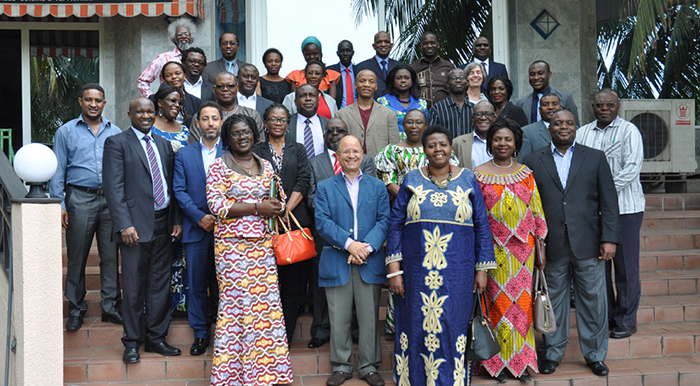 Despite undeniable progress, the continuous peace and security reverses witnessed across Africa illustrate the persistent gap that exists between aspirational good governance norms and principles and their actual implementation. Deficits in democratic governance affect large parts of Africa and are the main source of instability and insecurity across the continent. The effects of poor governance span a wide spectrum of issues that include poor political institutions, slow socio-economic development, lack of minority rights, and high levels of poverty. Often, these shortcomings culminate in violent conflicts.
Despite undeniable progress, the continuous peace and security reverses witnessed across Africa illustrate the persistent gap that exists between aspirational good governance norms and principles and their actual implementation. Deficits in democratic governance affect large parts of Africa and are the main source of instability and insecurity across the continent. The effects of poor governance span a wide spectrum of issues that include poor political institutions, slow socio-economic development, lack of minority rights, and high levels of poverty. Often, these shortcomings culminate in violent conflicts.
These issues were at the center of a regional roundtable discussion held in Accra, Ghana on August 5-6. The event, “Effective Governance in Challenging Environments,” was organized by IPI in collaboration with the Department of Political Affairs of the African Union Commission (AUC) and the Regional Service Centre at the United Nations Development Programme (UNDP).
The purpose of the two-day gathering was to explore additional practical ways to implement good governance values across the continent in an effort to improve the lives of ordinary African citizens. Representatives from the African Union (AU) and its institutions, regional economic communities, government representatives, members of African civil society organizations, women and youth groups, think tanks, and academic institutions attended the roundtable and shared their views and insights.
“Ineffective, exclusionary governance practices are at the root of many of the challenges facing the continent,” said IPI Senior Adviser Youssef Mahmoud in his opening remarks. “Effective governance, responsible leadership, and solid institutions are key to helping Africa meet its potential in ever challenging environments.”
Most of the event focused on identifying practical solutions to counter the negative effects of poor governance, in particular on what governments can do to address this problem.
In her keynote address, Fatuma Ndangiza, Chairperson of the Panel of Eminent Persons of the African Peer Review Mechanism (APRM), expressed her wish for the discussion to move beyond a normative dimension. “We need to have a robust exchange on how to ensure these normative instruments truly impact on the lives of the African citizens through effective implementation,” she said. Those who are claiming that Africa is on the rise “should ask themselves for whom,” she added.
The event was part of the preparatory process that will culminate in the AU-led Third High-Level Dialogue on Democracy, Human Rights and Governance, set to take place October 30-31 in Dakar, Senegal. The forum, titled “Silencing the Guns: Strengthening Governance to Prevent, Manage and Resolve Conflicts in Africa,” will continue the dialogue on improving governance structures on the continent in an effort to limit the outbreak of violent conflicts in the future.
“The purpose of the roundtable is to provide innovative suggestions that offer a window of opportunity for the engagement of state and non-state actors in finding durable and sustainable peace on the continent,” said Litha Musyimi-Ogana, Director of the AU Gender Directorate.
Finding peace on the continent, the panelists said, is possible if the existing challenges are properly addressed. The participants noted that, among other things, the continent suffers from a pervasive lack of inclusiveness as governments cannot deliver services to their citizens.
“Our challenge is to build inclusive and participatory systems and a state capacity that is able to deliver to our people,” said Gilbert Khadiagala, Professor of International Relations at the University of Witwatersrand in South Africa.
Mireille Affa’a Mindzié, Research Fellow at IPI, stressed that one way to achieve this would be by changing existing development paradigms that have shown their limitations.
“While development approaches have often been state-centric and top-down, with the hope that they would trickle down, local initiatives help to promote people-centered governance,” she said. Ms. Affa’a Mindzié, who recently conducted field research in Mali, Niger, and Senegal on the role of women and youth in building democratic participation, noted that what citizens often need is better government infrastructure and effective participation.
“Efforts should be aimed at increasing access to social services [such as] education for girls and healthcare,” she said.
Strengthening these state structures could, in the long run, change citizens’ relationship with their governments, turning it into a more positive and constructive one.
Several panelists also acknowledged that an enduring obstacle to more accountable governance is the attitude of governments themselves. They often lack the political will to address governance deficits and may not be interested in pursuing reforms. The result is that progress is hardly noticeable, and norms are rarely implemented.
Better citizen-government communication could play an important role in that regard, the panelists said. Social media and non-partisan reporting can go a long way, the panelists noted, in helping citizens be better informed about government activity. Some of the panelists suggested that technology such as mobile phones could be used in tracking electoral campaign manifestos.
Brian Kagoro of the UNDP Regional Service Centre and Lydia Amartey of Ghana’s Ministry of Foreign Affairs delivered welcoming remarks during the opening ceremony. IPI’s Director of Programs Maureen Quinn moderated the first session; Michelle Ndiaye Ntab, Director of the Africa Peace and Security Programme at the Institute for Peace and Security Studies moderated the second; Ambassador Ndangiza moderated the final session.
Younes Abouyoub, Emilie Beatrice Epaye, Beny Gideon Mabor, Cyril Obi, and Alioune Sall were also among the panelists.







